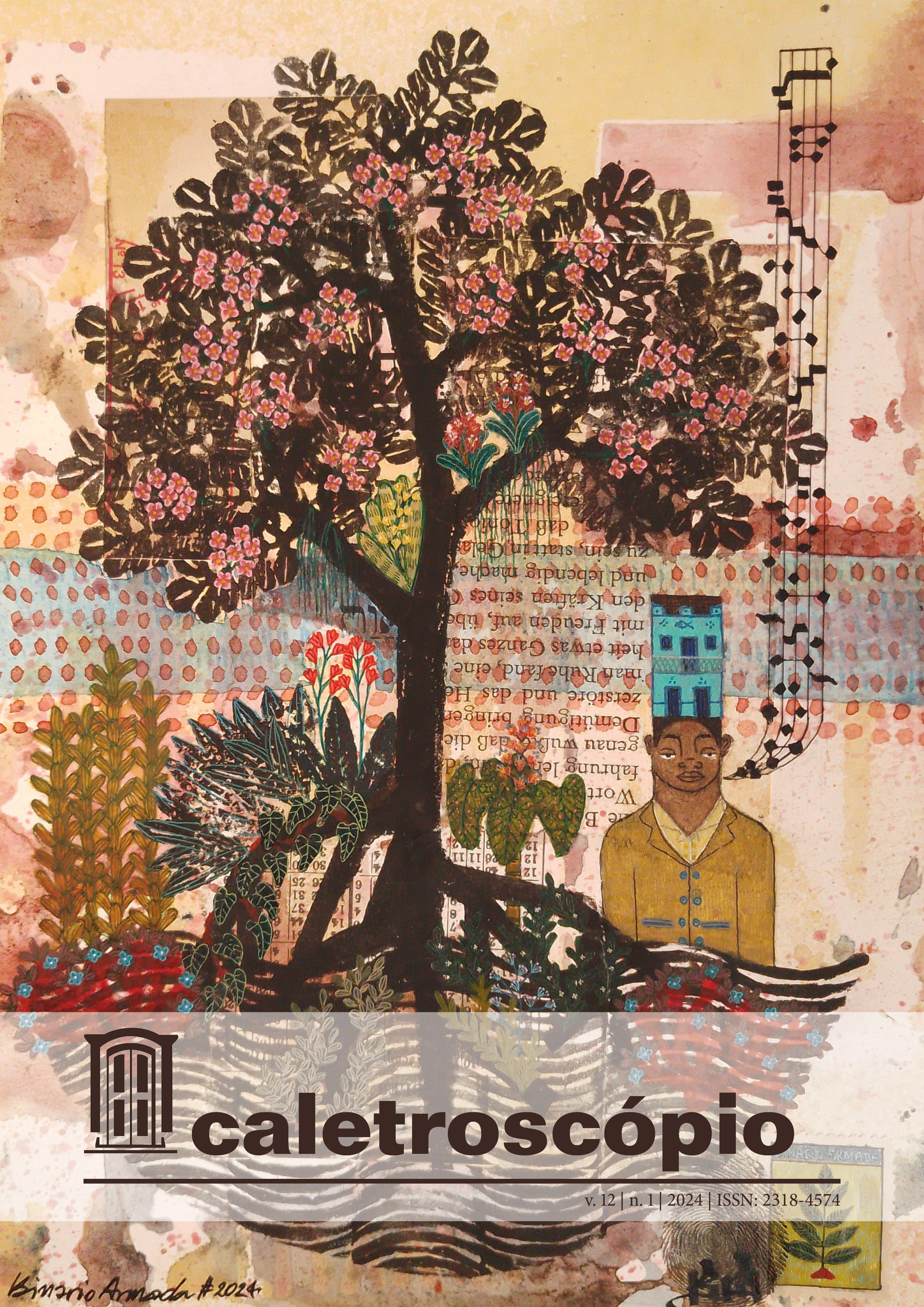The representification of the absent in The interminable body by Claudia Lage
Abstract
The objective of this work is to analyze the “representification of the absent” (Catroga, 2009) in Claudia Lage’s novel The Interminable Body (2019). The main hypothesis is the existence of a compressive force that acts on the protagonist creating tension between the absent body and the desired body. Brazil’s recent past is also revisited through fiction that strategically reincarnates anonymous voices, recovers the silence of missing politicians, and offers them a platform to testify. The novel provides an aesthetic and ethical open space for reflecting on a story compelled towards conclusion. Through literature, a critique is made not only of the official discourses of history, but also of the constitutive devices of collective memory that ignore the traumas left by state violence. In this context, The interminable body establishes a “dialogue with signs of absence” (Catroga, 2009) and serves as a testimony to those who did not survive state violence.
Downloads
References
BARTHES, Roland. Ausência. In: Fragmentos de um discurso amoroso. Trad. Márcia Valéria Martinez de Aguiar. São Paulo: Martins Fontes, 2003.
BATAILLE, Georges. O erotismo. Trad. Fernando Scheibe. Belo Horizonte: Autêntica Editora, 2013.
BERND, Zilá. Relendo a literatura brasileira contemporânea do ponto de vista da poética da ausência. In: Inventário de ausências. Porto Alegre: Zouk, 2022.
CATROGA, Fernando. Os passos do homem como restolho do tempo. Memória e fim do fim da história. Lisboa: Almedina, 2009.
CERTEAU, Michel de. O inominável: morrer. In: A invenção do cotidiano. Trad. Ephraim Ferreira Alves. Petrópolis: Vozes, 2014.
DERRIDA, Jaques. Espectros de Marx. Trad. Anamaria Skinner. Rio de Janeiro: Relume-Dumará, 1994.
FIGUEIREDO, Eurídice. A literatura como arquivo da ditadura. Rio de Janeiro: 7 Letras, 2017.
GINZBURG, Carlo. Representação. In: Olhos de madeira: nove reflexões sobre a distância. Trad. Eduardo Brandão. São Paulo: Companhia das Letras, 2001.
KEHL, Maria Rita. Três perguntas sobre o corpo torturado. In: KEIL, Ivete; TIBURI, Marica (orgs.). O corpo torturado. Porto Alegre: Escritos Editora, 2004.
LAGE, Cláudia. O corpo interminável. Rio de Janeiro: Record, 2019.
LOPES, Silvina Rodrigues. A forma exacta da dissipação. In: Literatura, defesa do atrito. Belo Horizonte: Chão de feira, 2021.
NANCY, Jean-Luc. Arquivida: do senciente e do sentido. Trad. Marcela Vieira, Maria Paula Gurgel Ribeiro. São Paulo: Iluminuras, 2017.
NANCY, Jean-Luc. Corpo, fora. Trad. Márcia Sá Cavalcante Schuback. Rio de Janeiro: 7Letras, 2015.
NANCY, Jean-Luc. Corpus. Trad. Tomás Maia. Lisboa: Vega, 2000.
OLMOS, Ana Cecília. Narrar na pós-ditadura (ou o potencial crítico das formas estéticas). In: SELIGMANN-SILVA, Márcio et al. Escritas da violência (Vol. 2). Rio de
Janeiro: 7Letras, 2012.
PAZ, Octavio. O mono gramático. Trad. Lenora de Barros e José Simão. Rio de Janeiro: Guanabara, 1988.
RANCIÈRE, Jacques. Se é preciso concluir que a história é ficção. Dos modos da ficção. In: A partilha do sensível. Trad. Monica Costa Neto. São Paulo: Editora 34, 2009.
RANCIÈRE, Jacques. Tempo, narrativa e política. In: Tempos modernos: arte, tempo, política. Trad. Pedro Tamm. São Paulo: n-1 edições, 2021.
RICHARD, Nelly. Políticas da memória e técnicas do esquecimento. In: MIRANDA, Wander Melo (org.). Narrativas da modernidade. Belo Horizonte: Autêntica, 1999.
RICHARD, Nelly. As marcas do destroço e sua recombinação no plural. In: Intervenções críticas: arte, cultura, gênero e política. Trad. Romulo Monte Alto. Belo Horizonte: Editora UFMG, 2002.
VENTURINI, Maria Cleci. História e memória em (dis)curso: Fernando Catroga e a poética da ausência. Interfaces, vol. 8, ed. especial, p. 127-145.
Copyright (c) 2024 Caletroscópio

This work is licensed under a Creative Commons Attribution-NonCommercial-NoDerivatives 4.0 International License.
The publication Caletroscopio shall retain for a period of three years all authorial rights for works accepted for publication: articles, reviews, translations, etc. Outside this restriction, these works are licenced through Licença Creative Commons-Atribuição-NãoComercial-SemDerivações 4.0 Internacional.
Upon expiry of this period, in the event that the author publishes the text, even when making alterations to the original, we would ask authors to include as a footnote, the information that a previous version of the article was published in the Revista Caletroscópio, citing the appropriate references.


